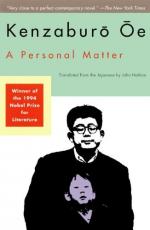|
This section contains 461 words (approx. 2 pages at 300 words per page) |

|
When Bird [protagonist of A Personal Matter] makes his final choice [to reject an adventurous life in favor of tedious domesticity], he is fulfilling, not [an] imported nineteenth-century romanticism, but an attitude native to Japan for almost as many centuries as [Westerners] have taken the attitude that action is intrinsically good, that rebellion is under a number of circumstances virtuous, particularly if it allegedly gives greater individual freedom, that fighting to the death against insurmountable odds carries with it its own honor. Bird and Ōe reject these convictions. Japan has a long tradition of accepting the inevitable which, in the West, is called resignation, which like "derivative," is an earnestly prejudicial term. For the Japanese, to assume the responsibilities imposed upon one by one's superiors, by filial piety and the like, is an act of virtue. To maintain existent orders is preferable to change, and certainly the subjugation...
|
This section contains 461 words (approx. 2 pages at 300 words per page) |

|


